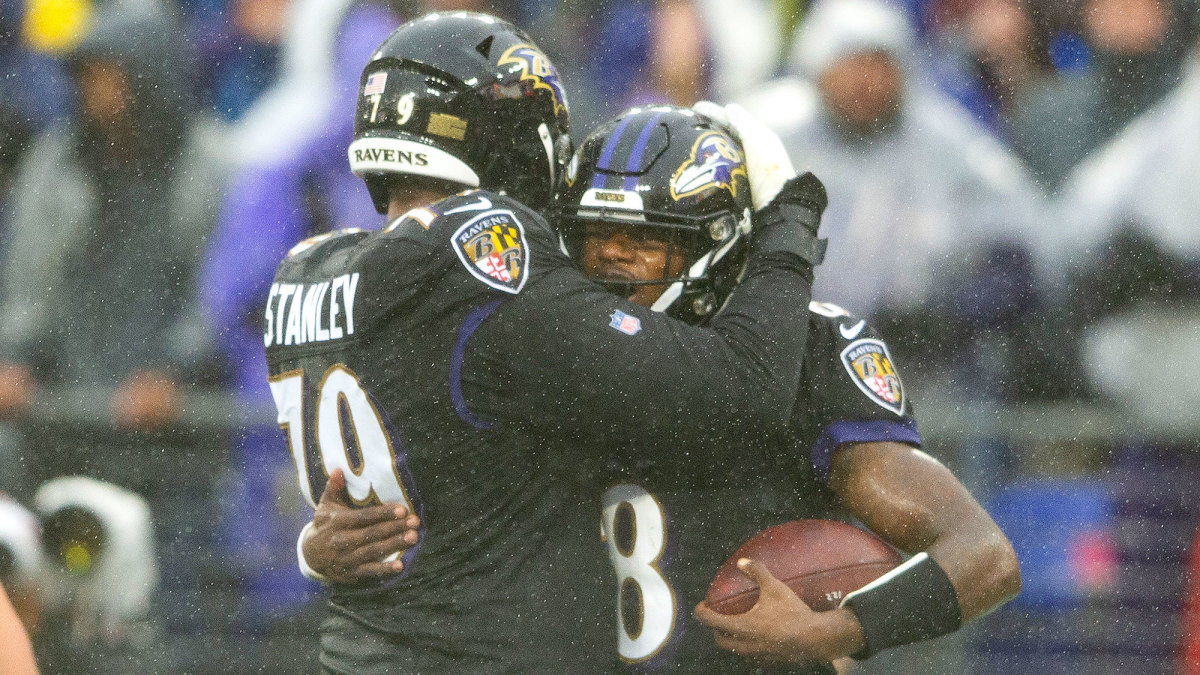The Secret Behind Lamar Jackson’s Success: The Ravens’ Offensive Line

BALTIMORE — On a first-and-10 just inside the Ravens’ 20-yard line early in the second quarter, Lamar Jackson faked a handoff to his right side and spun out to his left, darting toward the empty space opening up in front of him.
By now, this has become fairly standard viewing for Jackson and the Ravens’ offense that are utilizing their vaguely termed “option” concepts to redefine what the league considers to be play action and how defenders are supposed to react to it.
But what might go unnoticed is something that also takes place on a lot of these runs—a feat of athleticism that, if you’re grading on a scale, might align with that of Jackson himself, especially when considering that Baltimore was playing San Francisco, the NFL’s No. 1 defense, on Sunday. A quarterback playing like the NFL has never seen cannot have a season like this without an adaptable offensive line (and their supporting cadre of hybrid backs and blocking tight ends) that can do things an offensive line seldom does.
As Jackson skated down inside the five-yard line to set up the team’s second touchdown of the game, clearing the way on that play was left tackle Ronnie Stanley, who was helping Patrick Mekari by laying a hand on DeForest Buckner until he was too far inside to make a play. Then Stanley slid one step to his right and hooked Arik Armstead, affecting him just enough so that Jackson could get by.
After that, with the momentum of his 6' 6", 312-pound frame still leaning to the right, Stanley loops even further to his left like a pulling guard and sprints down field alongside Jackson, lead blocking him until the quarterback passed him by. At regular speed, this might look something like a military-grade Humvee trying to pull out of a parallel parking space. But in slow motion, where all of the intricacies of what that play involves athletically from just one person, it’s almost balletic.
“During camp when we condition, it’s just our responsibility to stay in shape,” Mekari said, when asked about how the line balances the downhill power blocking that has become the backbone of this offense with some collegiate concepts that involve a good deal of finesse. “Throughout practice, we’re just staying in shape. That’s our job.”

So it goes for this group of offensive linemen, who can be considered something of a group of misfits. Stanley was viewed as a consolation prize in the 2016 NFL draft when the Ravens were forced to pass on Laremy Tunsil after a suddenly-viral video of the lineman smoking pot nuked everyone’s draft board at the last minute. At the opposite tackle spot is Orlando Brown from Oklahoma, who had what some coined the worst combine in NFL history in 2018 after slogging to a near six-second 40-yard dash and flatlining on the bench press. Their best offensive lineman, and arguably one of the best guards in NFL history, Marshal Yanda, turned 35 at the beginning of the season.
And yet, on Sunday against the most athletic defensive front in football and the league’s No. 1 total D, they managed to create some situational advantages that helped Baltimore edge out a 20-17 win, both with athleticism that is rarely talked about and pure power blocking against an opponent with more defensive line talent than any team in the league.
Juxtaposed against the stylistic playfake in the second quarter were a pair of quarterback sneaks on Baltimore’s final drive—one on fourth-and-one and one on third-and-one—that set up Justin Tucker’s game-winning field goal. While these are obviously plays that carry a significant advantage for the offense, the shoddy field conditions and talent level on the defensive line probably skewed the odds a bit. Still, there was Jackson slipping off Yanda’s backside on the first conversion, just before midfield with a pile of 49ers defenders beneath them.
“Our offensive line, you have to give those guys credit,” Ravens head coach John Harbaugh said. “Centers, guards, tackles, the surge they had against that defensive line? That’s impressive.”
When asked if there was something particular Baltimore graded him on in college that might have led him here, Brown said “obviously with them taking Lamar [50 picks before me], I think they just kind of knew where they wanted to go with the scheme. I’m just blessed to be it a part of it. It’s a lineman’s dream.”
Mekari, who has been watching Yanda meticulously, might be able to sum it up best. Here’s a person who was drafted a full 10 years before the popularization of these concepts and on one play he’s knocking out a linebacker on a quarterback sneak. On another, like Stanley, he’s beating someone to the outside to make a critical block.
“He’s an absolute run mauler, and then some of these pass sets, you see how quick his feet are or see him getting to the edge, it’s amazing to watch.”
He added: “It’s shocking at times.”
Question or comment? Email us at talkback@themmqb.com.
